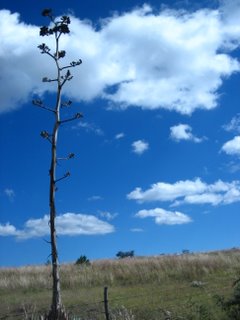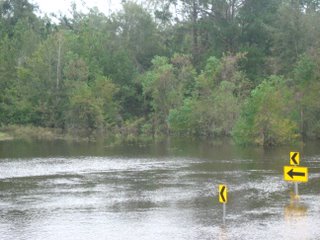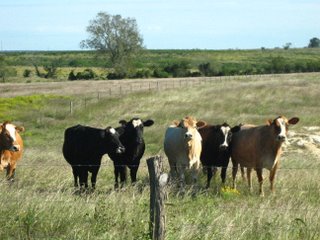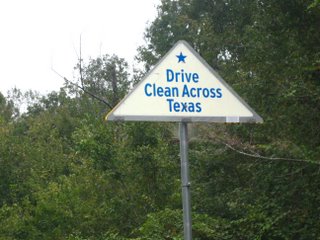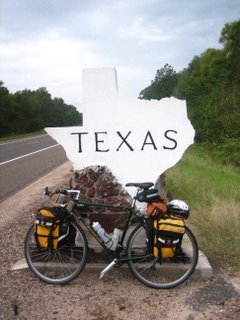Given memory’s random selectivity, it is rarely if ever possible to predict which of one’s experiences will stand out over time, or to qualify characteristics that memorable experiences share.
However, I believe I can name at least one inherently memorable trait: bipolar – that is, rapidly transitioning from good to bad, bad to good, or sometimes, normal to just weird.
I refer you, for instance, to a stormy evening resolved to be spent in the open on an Indian reservation, one of this journey’s more despondent moments. Then a good man bailed me out.
The most recent example: headed due east on highway 90, I was relying foolishly on a grotesquely disfigured front tire. It had developed a large hole. The spare piece of rubber I had placed underneath it to protect the inner tube had failed me, and both it and the inner tube had bubbled out, tumor-like. I was riding over a speed bump with each wheel revolution.
Perhaps it is going solo that allows a traveler to disregard inevitabilities to preserve a trip’s integrity. I, for one, require another’s rationality to prevent my idealism from obstructing my progress. When alone, I do things such as present myself with unachievable challenges to maintain focus, such as making it all the way across the country on the same two worn tires, or without washing my gloves. Idealistically, I think,
wouldn’t it be cool if I could… ?But consequences are inevitable. The bacteria in your unwashed gloves will give you a rash. Rubber cannot drink Gatorade and recover after a day of road exposure. Nor can you put Neosporin on a rubber patch and hasten rubber’s healing response, for it does not have one.
Alone, I do not hold such truths to be evident. I need someone to say, “You, friend, are an idiot.” So I tricked myself into believing my gimpy front tire could limp another 400 miles until the end. That, to me, was trip integrity.
I could only laugh when I stopped five miles from the nearest town and my tube exploded. How stupid. How depressing.
I stuck my thumb out and, as was the case with each of the few times I’d hitchhiked before, was offered a ride within two minutes. I abhor pickup trucks and their often brazen owners when I ride, but when I hitch, I am utterly thankful for their ubiquity.
The driver dropped me at a town called Ponce de Leon, who, you recall, sought futilely the Fountain of Youth after discovering what was later named Florida. This specific location has claimed him for its namesake because, as its web site notes, “Some folks think the Spanish explorer, Juan Ponce de Leon, may have searched for the Fountain of Youth here.” Some folks think they are Jesus, too.
Nevertheless, there are three springs either in or skirting the town. Good enough for me.
My luck was indeed turning for the better. As he let me out, the driver directed me to “Flutes and Vegetables,” a store that in its name employs perhaps the most sophisticated wordplay I’d encountered since Texas. “The guy who owns that place is a real bikehead,” he said. “Fact, they call him Bicycle Bill. He might be able to get you a new tire and tube.” The next bike shop was not for another 100 miles on my route, so why wouldn’t I go?
I sauntered inside, where a Jerry Garcia looking fellow rested behind a glass display case, stroking his beard, holding a bamboo shoot. I told him my dilemma. “I’m Patrick,” I offered. “Are you Bicycle Bill?”
“Used to be,” he said. “Now I’m Bamboo Bill.” I would learn that he had a somewhat fetishistic love for bamboo. He made flutes out of it. It grew in clusters all around his creek-side property, which he intended to turn into a veritable bamboo forest, and he undertook expeditions to find bamboo varieties deep in hidden Louisianan groves, among other places.
He didn’t elucidate the reasons for his plant lust, but he used the shoot in his hand as a walking stick, stabilizing his gait in lieu of a deteriorating hip that forced him to quit cycling (and, consequently, calling himself Bicycle Bill) five years ago. He’s a bear of a man and, because he refuses to move slowly, his stride now seems a constant pole vault run.
In any case, Bamboo Bill was more than inclined to help me. “We gotta find you a new tire!” he exclaimed. “How we gonna do that?”
He picked up the phone and called his friend Not Nearly Normal Nick. Like people interested in the same hobby, it seems people with alliterative nicknames befriend each other. Nick was in a bike shop in Panama City Beach when he picked up his phone. He asked my tire size. I told him. He bought a tire and a tube to match. He drove them to Ponce de Leon and gave them to me. I paid him and thanked him profusely for going out of his way. And like that, the day went from bad to good to even better when Bamboo Bill told me I could stay the night on his verdant property.
During the rest of that evening, I would ride shotgun as Bill drove and drank, his 15-year-old son in the back seat complaining about the music; I would do my best to divert his interminably excited dog, which guarded my tent all night; I would talk drug policy with Bill, who did time for selling acid in the ‘60s; I would listen to his brother’s latest record, which Bill championed as providing lyrics of great profundity (all I would hear was childishly crafted poetry, thin compositions and hackneyed invocations to The Man); we would drive by his ex-wife’s house, which was a block away from his, and he would show concern about the 21-year-old guy who was over visiting his 16-year-old daughter.
He would tell me that he, too, used to hitchhike, though farther and more frequently than I. Thousands of miles in single trips he’d hitchhike, from hot spring to hot spring, from state to state. He never troubled in getting a ride, because he had an infallible formula: carry a cooler and hold up a sign that reads “Ice Cold Beer.” Got a ride every time.
As for me, I prefer to look unthreatening by wearing spandex and walking alongside a bike. That works too, and it doesn’t put me at risk. Unless, of course, whomever I ride with already has the beer.
Then I fasten my seatbelt.
